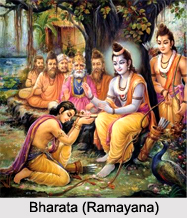 Bharata was the second brother of Lord Rama and the son of Dasaratha and Kaikeyi of the Solar Dynasty in the Hindu epic Ramayana .He is considered to be born in the aspect of the Sudarshana Chakra, the most famous of Vishnu`s Panchayudhas. Although the Ramayana describes all four brothers as loving and devoted to one another Shatrughna was close to Bharata and Lakshmana was close to Rama was the common notion. He was married to Mandavi daughter of King Janaka`s brother Kushadhvaja, and hence a cousin of Sita. They had two sons, Taksha and Pushkala.
Bharata was the second brother of Lord Rama and the son of Dasaratha and Kaikeyi of the Solar Dynasty in the Hindu epic Ramayana .He is considered to be born in the aspect of the Sudarshana Chakra, the most famous of Vishnu`s Panchayudhas. Although the Ramayana describes all four brothers as loving and devoted to one another Shatrughna was close to Bharata and Lakshmana was close to Rama was the common notion. He was married to Mandavi daughter of King Janaka`s brother Kushadhvaja, and hence a cousin of Sita. They had two sons, Taksha and Pushkala.
The Ramayana is the story of how Rama was sent to exile in the forest for 14 years by Dasratha on the advice of Kaikeyi in order to put Bharata her own son on the throne of Ayodhya.Bharata was away from Ayodhya when Rama went to exile .When he returned and heard about Rama`s exile he declared his intention of bringing Rama back from the forests, and if need be, of serving out his exile for him. When the people of Ayodhya and the numerous allies of Rama heard of this, their scorn and hatred towards Bharata (born out the assumption that he had a role in Rama`s exile) dissolved, and he was immediately made immortal in fame to the world by his selflessness, honour for his family`s fame and tradition, adherence to truth and righteousness and last but not least, love for his older brother.Ayodhya`s guru Vasishta stated that no one had learned the lessons of dharma better than Bharata.
When Bharata met Rama and Lakshmana in the forest and delivered the painful news of their father`s death he pleaded Rama to return to Ayodhya as the new emperor .Rama refused this on the ground that such a deed would be unrighteous . Upon an explanation from King Janaka that since Bharata`s love for Rama was unparalleled it became his duty to enable Rama to live righteously,and therefore Bharata gave up his efforts to take Rama back to Ayodhya before the completion of the fourteen years .Before leaving he vowed to Rama that if Rama did not return immediately after the completion of fourteen years ,he would give his life up by immolation.He agreed to govern Ayodhya not as its ruler but only as Rama`s representative.The people supported Bharata, as he became the `king` of Kosala and Ayodhya, but Bharata himself placed Rama`s sandals at the foot of the royal throne, and neither sat upon the throne nor crowned himself.
Bharata`s reign was righteous and the kingdom was safe and prosperous but Bharata waited for Rama`s return .During this time he diligently served Kousalya ,Rama`s mother and Sumitra ,Lakshmana`s mother.
Upon Rama`s return to Ayodhya after defeating Ravana ,Bharata led the procession to greet the rightful king and queen and his brother Lakshmana.When Rama decided to retire,Bharata and Shatrughna joined him. When Rama walked into the river Sarayu, he transformed into his eternal and original Mahavishnu form, which Bharata and Shatrughna walked into the river also and united with him.



















